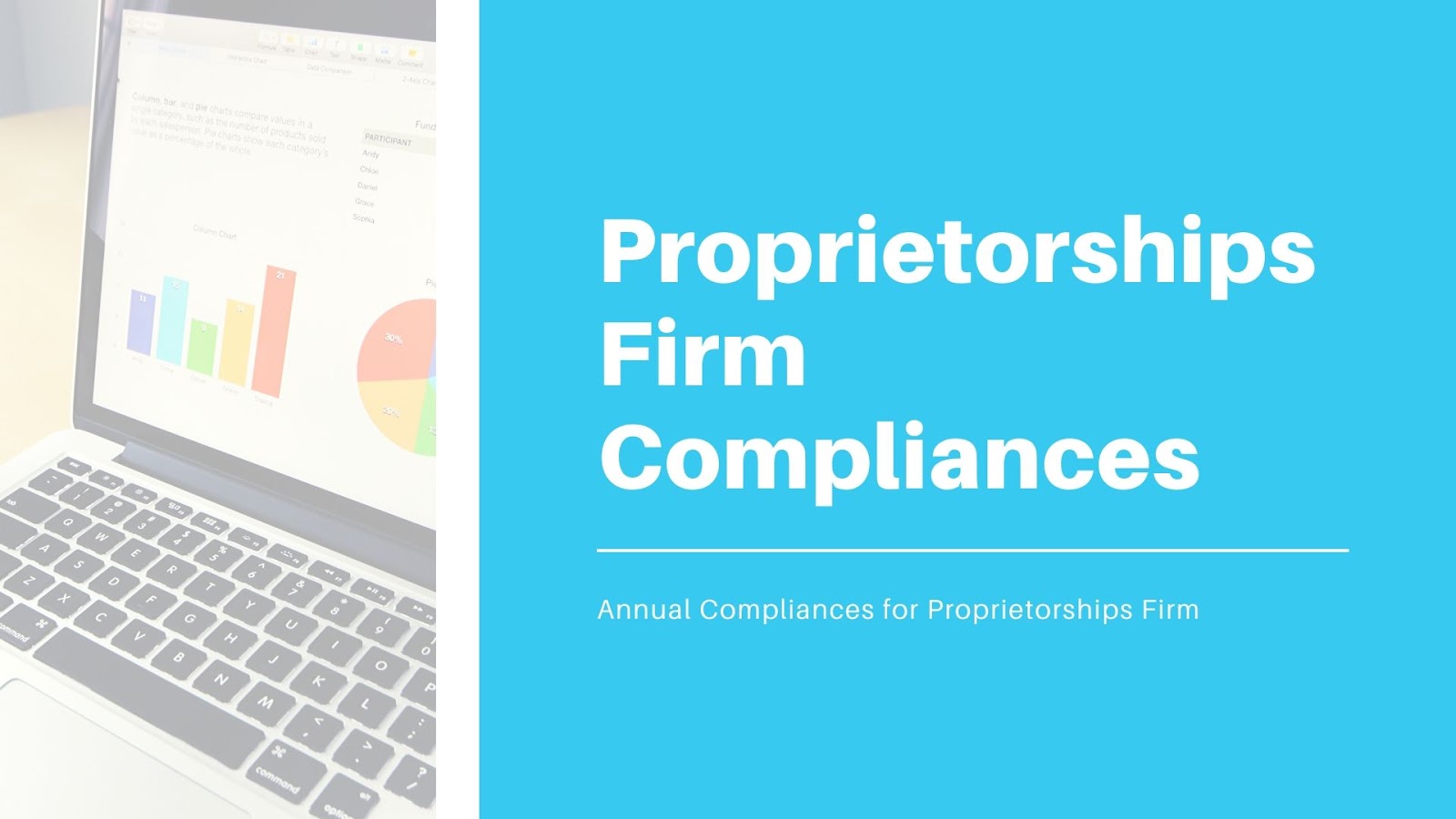Annual Compliances for Proprietorship Firm
Sole Proprietorships of India have only the smallest
legal acquiesced, which are much lesser than those applicable to the private or
public limited corporations. It is essentially owing to the fact that a sole
proprietorship has no disparate certified entity distinct from its owner or
proprietary, and this form of industry existence does not make use of the
benefits of limited liability. The annual revenue of the possessor is measured
the annual earnings of the sole proprietorship firm.
Henceforth,
like other business or service entities that are listed and enrolled under the
MCA, i.e., the Ministry of Corporate Affairs, the sole proprietorship firms are
not required to record an annual statement or budgetary declarations with the
MCA. The main and important statutory compliances to be executed by these
proprietorship firms are consequently tax-related recurring and year-long
compliances. Nonetheless, some more recurrent or annual compliances may also be
required for the goals of business administration or authentication and
identification. Hence, the major Proprietorships
Firm Compliances in India, are the following:
● SERVICE
TAX RETURNS
These are
recorded on a semi-annual basis, on the said scheduled dates of the assessment
accounting year.
● INCOME
TAX RETURNS
ITR is filed
on a regular and annual basis, on the said dates that are contingent upon the
requirement and obligations of fiscal or tax audit.
1) When an examination of accounts is not
mandatory under any source, then 31st July of the appraisal financial year is
the date.
2) When the examination of accounts is
necessary under any law, then 30th September of the assessment financial year
is the date. This gets implemented when the annual yield of the proprietorship
firm is over INR 1 crore or the service revenue is more than INR 25 lacs.
Individuals,
when registering into a company to carry out a business, are called partners
and the firm they operate is called a partnership firm. In India, Partnership Firms are administered and
ruled by the Indian Partnership Act, 1932. A partnership firm is where the
diverse partners decide the terms and conditions and all the contingency of the
business processes and have many lawfully enforceable and compliance aspects.
The aforesaid kind of interest is best resolute by the specialist. That is
mainly the reason, why it is optional to choose All India ITRs annual
compliances program where they all will take care of all their annual
necessities and provide them with full support on how to define a partnership
deed, appoint an auditor, drafting of legal contracts and other secretarial
duties.
Prices may
vary as per the individual’s annual sales or turnover. They will be unsettled
about the charges applicable to them by our tax authorities, during the time of
consultancy.
Services
included under such plans for Annual
Compliance for Proprietorship Firm are:
● TDS Return Filing
● Documentation
● GST Compliances
● Income Tax Return
● Drafting
of Financial Statements


Hello.. Wonderful blog with very useful information. Thanks for sharing this information with us. Visit our website for One person company benefits and compliances
ReplyDelete
ReplyDeleteHello.. Wonderful blog with very useful information. Thanks for sharing this information with us. Visit our website for Annual Compliance for LLP Company
Excellent Article.
ReplyDeleteWe provide ROC Annual Filing Services in Chennai India
rblw
ReplyDeleteThe blog that you have shared about annual roc compliance for private limited companies in Singapore is informative. Thanks for sharing.
ReplyDeleteThis comment has been removed by the author.
ReplyDeleteThis comment has been removed by the author.
ReplyDeleteAll of the requirements that a private limited company must do each year in order to comply with laws and regulations are included in annual compliance .For all types of companies, annual compliance is necessary. The compliance rules, however, must be followed by every company.
ReplyDeleteThe benefits of owning a business can't be reaped by a sole proprietorship as it grows. Consequently, the proprietorship must be converted into a limited company. By converting to a company, all the benefits of a company can be gained, like limited liability, higher capital, etc.
ReplyDeleteTo learn more,
Visit Sole Proprietorship to Private Limited Company
food processing operations fssai - Several types of FSSAI license are available to ensure that the authority can handle different types of food business operations efficiently. Here's everything you need to know about the FSSAI registration process and the FSSAI license categories. The FSSAI license categories are based on size, turnover and food categories.
ReplyDeleteBefore understanding the meaning of working capital loans, let us first understand the meaning of working capital. Working capital is the amount of money required for carrying out the day-to-day operations of any business. know more here - https://vakilsearch.com/blog/advantages-and-disadvantages-of-working-capital-loan/
ReplyDeleteA caste certificate is evidence of one’s belonging to a particular caste. This certificate helps in reservations and availing government subsidies and facilities. check more about caste certificate
ReplyDeleteVery Nice Excelent and Informative. Must Visit Here. annual compliance securitised debt instruments sebi. Must Read it.
ReplyDelete